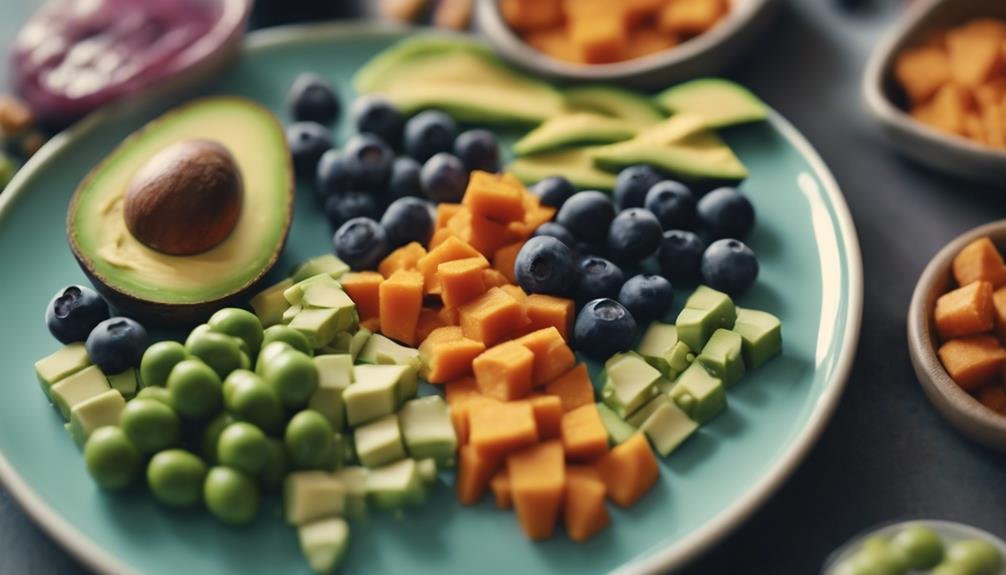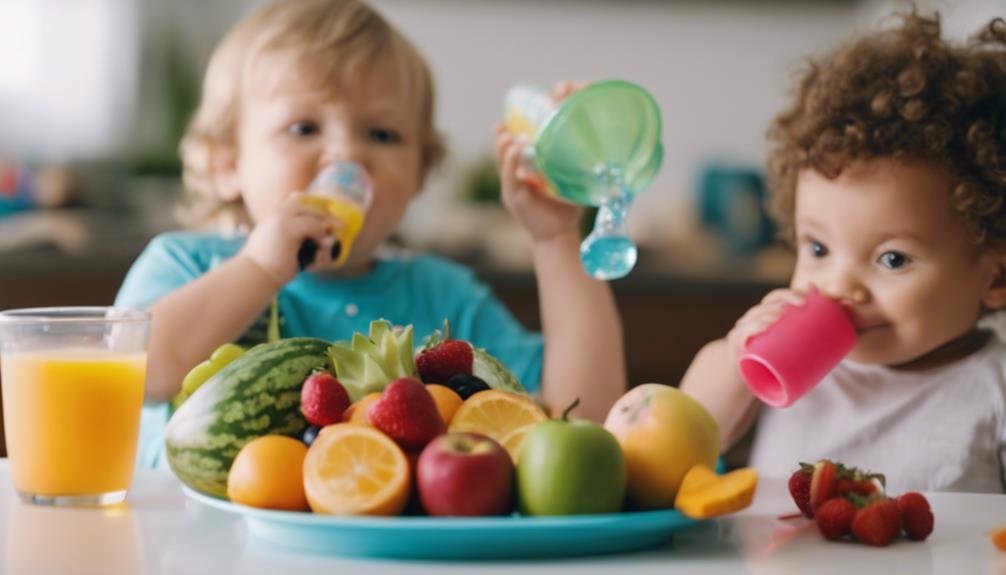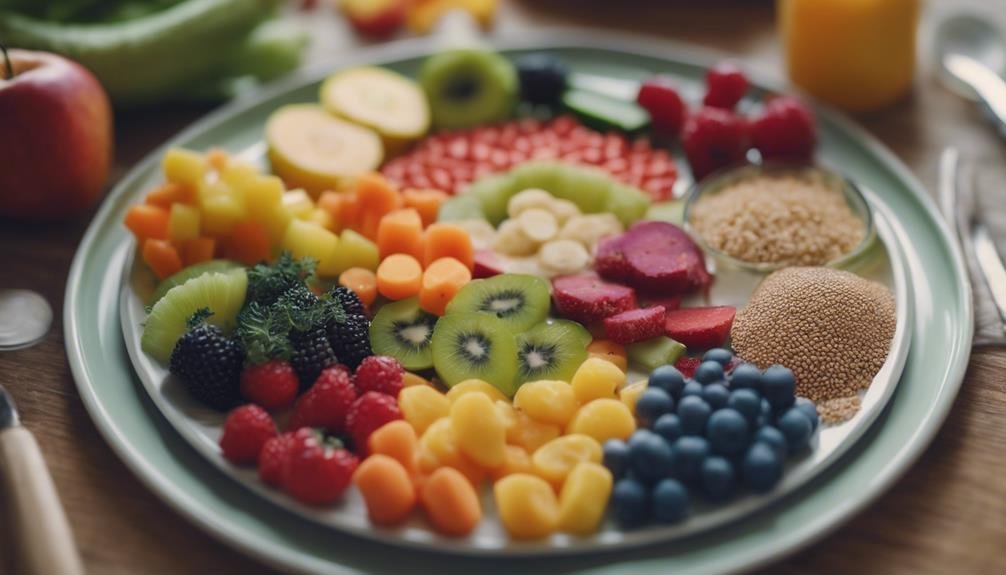"Cherishing Little Steps - A Haven for Baby and Family Journeys"
The Best Diets for Toddlers: A Pediatrician’s Recommendations
When it comes to your toddler's diet, ensuring they receive the right balance of nutrients is crucial for their growth and development. Pediatricians recommend specific food groups and meal plans to support their overall health. By incorporating various nutrient-rich foods and addressing common deficiencies, you can lay a strong foundation for your child's well-being. But what are the specifics behind these recommendations? Let's explore the expert advice on the best diets for toddlers and how you can optimize your little one's nutrition for a healthy future.
Key Takeaways
- Include fruits, vegetables, whole grains, lean proteins, and dairy in toddlers' diets for essential nutrients.
- Craft balanced meal plans with a variety of foods from different food groups for optimal nutrition.
- Ensure hydration with water and hydrating foods to regulate body temperature and aid digestion.
- Address common nutrient deficiencies with iron-rich foods, calcium sources, vitamin D, fiber, and omega-3 fatty acids.
- Opt for low-sugar, nutrient-rich snacks like fresh fruits, yogurt, and homemade fruit popsicles for healthy energy levels.
Nutrient-Rich Foods for Toddlers

When feeding toddlers, prioritize incorporating a variety of nutrient-rich foods into their diet to support their growth and development. Toddlers have high energy needs and nutrient requirements to fuel their active bodies and promote brain development. Including foods like fruits, vegetables, whole grains, lean proteins, and dairy products can ensure they get essential vitamins and minerals.
Fruits and vegetables are packed with vitamins, fiber, and antioxidants that boost their immune system and overall health. Whole grains like brown rice, whole wheat bread, and oats provide energy and essential nutrients for their growing bodies. Lean proteins such as chicken, fish, beans, and tofu are crucial for muscle development. Dairy products like milk, cheese, and yogurt offer calcium for strong bones and teeth.
Balanced Meal Plans for Toddlers
To ensure your toddler receives a well-rounded diet, crafting balanced meal plans is key to meeting their nutritional needs and supporting their growth and development. A balanced meal plan for toddlers should include a variety of foods from different food groups to provide essential nutrients. Aim to include fruits, vegetables, whole grains, lean proteins, and dairy in your toddler's daily meals.
Start the day with a nutritious breakfast such as whole grain cereal with fruit or scrambled eggs with whole wheat toast. For lunch and dinner, offer a mix of vegetables, proteins like chicken or tofu, and carbohydrates such as brown rice or pasta. Snacks can include cut-up fruits, yogurt, or whole grain crackers with cheese.
Remember to offer water throughout the day to keep your toddler hydrated. By planning meals that incorporate a range of nutrients, you can help support your toddler's overall health and well-being. Consulting with a pediatrician or a nutritionist can also provide personalized guidance for your child's specific dietary needs.
Importance of Hydration for Toddlers

Ensuring your toddler stays well-hydrated throughout the day is crucial for supporting their overall health and development. Hydration is essential as it helps regulate body temperature, aids digestion, and maintains healthy skin.
Toddlers are more prone to dehydration than adults due to their higher metabolic rate and smaller fluid reserves. Signs of dehydration in toddlers include dry lips, dark urine, and fussiness. To prevent this, offer your toddler water frequently, especially in hot weather or when they're active.
Limit sugary drinks as they can cause fluctuations in blood sugar levels and lead to decreased hydration. Encourage your child to drink water by making it easily accessible and fun, such as using colorful cups or straws. If your toddler is resistant to drinking water, try incorporating hydrating foods like watermelon, oranges, or cucumbers into their diet.
Snack Ideas for Healthy Toddlers
Hydrating snacks play a crucial role in maintaining the health and energy levels of toddlers. When choosing snacks for your little one, opt for fresh fruits like watermelon, strawberries, or oranges. These fruits aren't only delicious but also high in water content, helping keep your toddler hydrated throughout the day.
Another great option is cucumber slices paired with hummus or yogurt dip, providing a hydrating crunch that toddlers love.
For a more filling snack, consider making homemade fruit popsicles using natural fruit juices or blended fruits. These treats aren't only refreshing but also a fun way to sneak in some extra vitamins and minerals. Additionally, low-sugar yogurt with added fresh berries can be a satisfying and hydrating snack for your toddler.
Common Nutrient Deficiencies in Toddlers

Addressing common nutrient deficiencies in toddlers starts with understanding the importance of a balanced diet tailored to their growing needs. Toddlers have higher nutrient requirements per pound of body weight compared to adults, making it crucial to ensure they receive adequate levels of essential nutrients. Here are some common nutrient deficiencies in toddlers and the foods that can help meet their needs:
| Nutrient Deficiency | Foods to Include |
|---|---|
| Iron | Lean meats, beans, fortified cereals |
| Calcium | Dairy products, tofu, leafy greens |
| Vitamin D | Fatty fish, egg yolks, fortified milk |
| Fiber | Fruits, vegetables, whole grains |
| Omega-3 fatty acids | Salmon, chia seeds, flaxseeds |
Allergen Awareness in Toddler Diets
Moving on from discussing common nutrient deficiencies in toddlers, a crucial aspect to consider in their diets is allergen awareness. It's essential to be mindful of potential allergens that could pose a risk to your little one's health. Allergies to foods like peanuts, eggs, milk, soy, wheat, fish, and shellfish are common in young children and can range from mild reactions to severe ones like anaphylaxis.
When introducing new foods to your toddler, do so one at a time and observe for any signs of an allergic reaction, such as hives, wheezing, vomiting, or diarrhea. If you suspect an allergy, consult with your pediatrician promptly. Remember, even foods that are considered healthy and nutritious can trigger allergic responses in some children.
To minimize the risk of allergens in your toddler's diet, read food labels carefully, communicate with caregivers about your child's allergies, and consider consulting with a pediatric allergist for further evaluation if needed. Prioritizing allergen awareness can help ensure a safe and healthy diet for your little one.
Tips for Picky Eaters in Toddlers

Wondering how to encourage your picky eater to try new foods and develop healthy eating habits? It can be a challenging task, but with patience and some helpful tips, you can navigate this phase successfully. Here are three strategies to help your little one expand their palate and enjoy a variety of nutritious foods:
- Introduce One New Food at a Time: Start by introducing small portions of new foods alongside familiar favorites. Encouraging your toddler to try just a bite can help them become more comfortable with different flavors and textures.
- Get Creative with Presentation: Sometimes, the way a food looks can make a big difference. Try cutting fruits and vegetables into fun shapes or arranging them in a visually appealing manner on the plate to make mealtime more engaging for your picky eater.
- Lead by Example: Children often mimic the behavior of adults around them. Show your child how much you enjoy eating a diverse range of foods and involve them in meal preparation. Seeing you try new foods can inspire them to do the same.
Frequently Asked Questions
How Can I Encourage My Toddler to Eat More Vegetables?
Encouraging your toddler to eat more vegetables can be fun! Try offering a variety of colorful veggies, involving them in meal preparation, and being a role model by enjoying veggies yourself. Positive reinforcement and patience are key!
Are There Any Creative Ways to Make Mealtime Fun for Toddlers?
To make mealtime fun for toddlers, involve them in meal prep, use colorful plates and utensils, create fun shapes with food, play music, and tell stories. Engaging them in the process can make eating a joyful experience.
What Are Some Healthy Alternatives to Sugary Snacks for Toddlers?
When looking for healthy snacks for your toddler, opt for fruit slices, yogurt, or veggie sticks. These choices are nutritious and low in added sugars, helping your little one develop good eating habits.
Can Toddlers Get Enough Iron From Plant-Based Sources?
Yes, toddlers can get enough iron from plant-based sources like beans, lentils, tofu, and fortified cereals. Pairing these with Vitamin C-rich foods helps absorption. A variety of plant foods in their diet ensures they meet iron needs.
How Can I Safely Introduce New Foods to My Toddler's Diet?
When introducing new foods to your toddler, go slow. Offer small portions of various foods. Be patient and persistent. Keep mealtimes pleasant. Encourage exploration and provide a balanced diet for their growth and development.
Conclusion
As you navigate the world of feeding your toddler, remember that a well-rounded diet is key to their health and development. By incorporating nutrient-rich foods, offering balanced meals, and ensuring hydration, you're setting them up for success.
Stay tuned for more tips and tricks to keep your little one happy and healthy as they grow. Your commitment to their nutrition is truly making a difference in their future well-being. Keep up the great work!



Maximize Water Efficiency with Bwer Pipes’ Irrigation Solutions: At Bwer Pipes, we understand the importance of water conservation in Iraqi agriculture. That’s why our irrigation systems minimize water wastage while delivering precise hydration to your crops. Experience the difference with Bwer Pipes. Visit Bwer Pipes
Esti in cautarea celor mai cool si confortabile adidasi pentru femei, nu trebuie sa cauti mai departe! La Puma Moldova, gasesti o gama variata de modele, perfecte pentru a-ti completa tinutele sportive sau casual. Cu o simpla vizita pe pumamoldova.md, poti achizitiona adidasi pentru femei care nu doar arata bine, dar si sunt construiti pentru performanta si confort. Fie ca preferi un design clasic sau ceva mai indraznet, vei gasi optiuni pe gustul tau. Descopera gama noastra acum si completeaza-ti colectia de adidasi cu cele mai tari modele de la Puma Moldova!